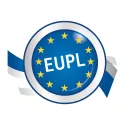

From the British licensors point of view, will the Brexit produce substantial changes on terms and conditions governed by the European Union Public Licence (EUPL)?
In fact, the Brexit could have a significant impact on the applicable law and jurisdiction, especially when the licensor is a public sector institution from the UK (central or regional government, municipalities) or an enterprise (small/medium or even large) which has its seat in the UK but no seat or registered office in another country of the European Union.
While some free licences refers explicitly to the law of California or to the US legal background in general, most of them keep silence about the applicable law, leaving local judges solving this delicate question.
This is not the case with the EUPL, which clearly specifies the applicable law in its article 15, first part:
After the Brexit, the United Kingdom will not be considered anymore as “European Union Member State”, so what will be the applicable law? Article 15, second part, provides the answer:
Therefore, for the above British licensors and all their users, a significant impact is the change of the applicable law, from UK to Belgium!
At the contrary, the jurisdiction will not change and will stay in the UK, as article 14, second part, states:
However, the jurisdiction in UK has to apply the Belgian Law, which is directly transposed from the European Directive 2009/24/EC on the legal protection of computer programs. On many points, especially concerning open source software where the source code is published, or concerning closely linking programs for making them interoperable in a global solution, it will be necessary to interpret the Directive. National jurisdictions of EU Member States benefit from the preliminary ruling procedure, which is exercised before the Court of Justice of the European Union and enables national courts to question the Court of Justice on the interpretation or validity of European law. UK jurisdictions questioned the Court on the Directive in the past, like in the 2012 case C-406/10 SAS vs WPL. But after the Brexit, will UK jurisdictions still benefit from this procedure that is a privilege of EU national jurisdictions?
This is, like many other points, depending on the Brexit negotiation between UK and the Union…